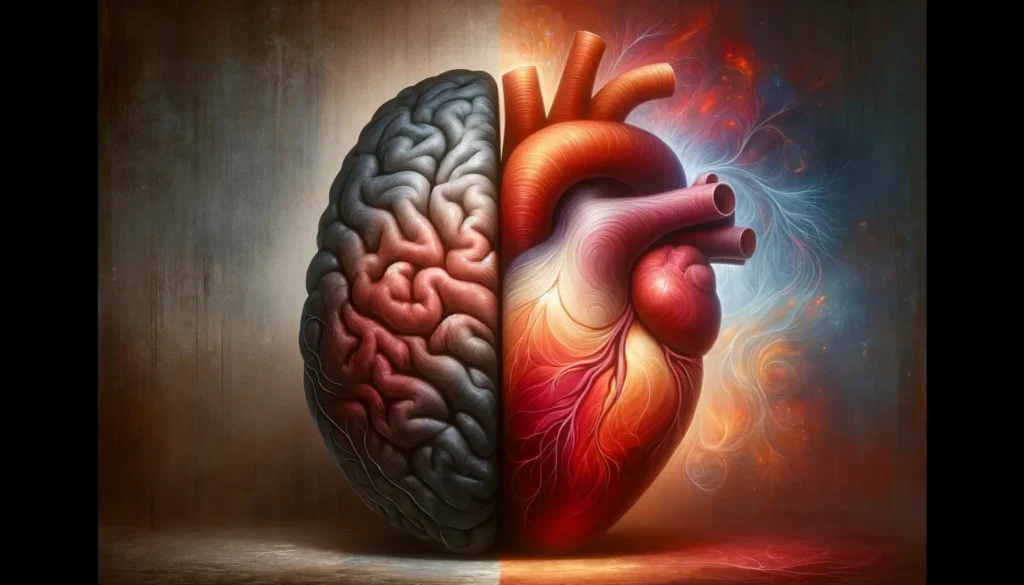Mental health plays a vital role in our overall well-being, affecting various aspects of our lives, including our sexuality.
The connection between mental health and libido, or sexual desire, is a complex one. Psychological factors such as stress, chronic conditions, hormonal changes, sleep problems, and substance use can all influence a person’s sex drive.
Moreover, low libido can often be a symptom of underlying emotional, relationship, or mental health issues, such as depression, anxiety, relationship problems, or poor body image.
Key Takeaways:
- Mental health has a significant impact on libido and sexual desire.
- Stress, chronic conditions, hormonal changes, sleep problems, and substance use can affect libido.
- Low libido can be a symptom of underlying emotional, relationship, or mental health issues.
- Depression, anxiety, relationship problems, and poor body image can dampen sexual desire.
- Seeking help from a healthcare professional is important if low libido is impacting well-being or relationships.
Causes of Low Libido
Low libido, or a decrease in sexual desire, can be attributed to various factors. It is important to understand these causes in order to address and manage low libido effectively. Some of the common causes include:
- Mental Health and Low Libido: Mental health issues such as depression and anxiety can significantly impact sexual desire. Changes in neurotransmitter activity and feelings of low self-esteem can contribute to a decrease in libido.
- Depression and Low Libido: Depression often leads to a loss of interest in sex. The emotional and physical exhaustion associated with depression can interfere with sexual desire and pleasure.
- Anxiety and Low Libido: Chronic anxiety and high levels of stress can divert resources away from sexual functioning, reducing sexual desire and satisfaction.
- Relationship Problems and Low Libido: Difficulties in relationships, conflicts, and unresolved issues can dampen sexual desire and lead to a decline in libido.
- Poor Body Image and Low Libido: Negative feelings about one’s body image can have a significant impact on sexual desire. Insecurities related to physical appearance can lower self-esteem and hinder sexual enjoyment.
Aside from mental health issues and relationship problems, low libido can also be influenced by physical factors such as chronic conditions like diabetes, arthritis, and heart disease.
Medications used to manage these conditions may have side effects that decrease sexual desire. Hormonal changes during menopause, sleep problems, excessive stress, and substance use can also affect libido.
To address low libido effectively, it is essential to identify the underlying causes and seek appropriate support.
Consulting with a healthcare professional can help determine the best course of action, whether it involves addressing mental health concerns, improving communication and intimacy in relationships, or exploring medical and lifestyle interventions.

Addressing Low Libido and Improving Sexual Health
If low libido is impacting your well-being, emotional health, or relationships, it’s important to seek help from a healthcare professional. Various treatments for low libido exist, depending on the root causes, which can include medical issues, lifestyle behaviors, mental health conditions, or emotional challenges.
Open and honest communication with your healthcare provider is crucial in developing a personalized plan to address low libido and improve your sexual health and satisfaction.
They can provide guidance and recommend appropriate interventions, such as counseling or therapy, hormonal therapy, medication adjustments, or lifestyle modifications.
By addressing the underlying causes of low libido and prioritizing your sexual well-being, you can experience enhanced sexual satisfaction and overall quality of life.
Note: Seek professional help to address low libido and improve your sexual health and satisfaction.
| Treatment Options for Low Libido | Benefits |
|---|---|
| Counseling or Therapy |
|
| Hormonal Therapy |
|
| Medication Adjustments |
|
| Lifestyle Modifications |
|
Conclusion
Mental health has a profound impact on a person’s sexual desire and function. Understanding how mental health affects libido is crucial for improving sexual well-being and satisfaction.
By recognizing the various factors that can contribute to low libido, such as stress, chronic conditions, medications, and emotional or relationship issues, individuals can seek the appropriate support and treatment they need.
Addressing mental health concerns and developing healthy coping strategies is essential for enhancing sexual satisfaction and overall quality of life.
It is important to remember that low libido is often a symptom of underlying issues related to mental health, physical health, lifestyle, or relationships.
Seeking help from a healthcare professional is vital in addressing low libido and developing a personalized plan to improve sexual health and well-being.
By taking steps to address mental health and its impact on sexuality, individuals can nurture a positive relationship with their own bodies and sexual experiences.
Prioritizing self-care, open communication, and seeking professional assistance when needed are important steps towards enhancing sexual satisfaction and achieving overall well-being.
FAQ
How does mental health impact libido?
Mental health can have a significant impact on libido, or sexual desire. Conditions such as depression, anxiety, relationship problems, and poor body image can contribute to low sexual desire.
What are the causes of low libido?
Low libido can be caused by various factors, including stress, chronic conditions like diabetes and heart disease, hormonal changes, sleep problems, and substance use. Mental health issues, such as depression, anxiety, and relationship problems, can also contribute to low libido.
What is the relationship between mental health and libido?
Mental health and libido are closely connected. Depression can lead to a loss of interest in sex and altered neurotransmitter activity. Anxiety can divert resources away from sexual functioning. Relationship problems and poor body image can also dampen sexual desire.
How can low libido be addressed and sexual health improved?
Treatment for low libido depends on the root causes, which can include medical issues, lifestyle behaviors, mental health conditions, or emotional challenges. Seeking help from a healthcare professional and having open communication is important to develop a personalized plan for improving sexual health and satisfaction.
What is the impact of mental health on sexual well-being and satisfaction?
Understanding the impact of mental health on libido is crucial for addressing and improving sexual well-being. By recognizing the factors that can contribute to low libido and seeking appropriate support and treatment, individuals can enhance their sexual satisfaction and overall quality of life.




